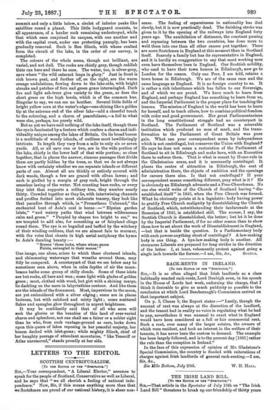LETTERS TO THE EDITOR.
SCOTTISH CENTBIFUGALISM.
[To raz F.Drros or urn .[frscrszoz."] Brit,—Your correspondent, "A Liberal Elector," assumes to speak for the people of Scotland, Conservative as well as Liberal, and he says that "we all cherish a feeling of national inde- pendence." Now, Sir, if this means anything more than that we Scotchmen are proud of our national history, it is sheer non- sense. The feeling of separateness in nationality has died slowly, but it is now practically dead. The finishing stroke was given to it by the opening of the railways into England forty years ago. The annihilation of distances, the constant passing and repaving between the two countries, has done more to weld them into one than all other causes put together. There are more Scotchmen in England at this moment than in Scotland itself. Scarcely a family but has its representative in England, and it is hardly an exaggeration to say that most working men even have themselves been in England. Oar Scottish nobility, who used to have their town houses in Edinburgh, now go to London for the season. Only one Peer, I am told, retains a town house in Edinburgh. We are of the same race and the same language as England. It is no foreign country to us. It is rather a rich inheritance which has fallen to our Sovereign, and of which we are proud. We have much to learn from England, and perhaps England has something to learn from us, and the Imperial Parliament is the proper place for teaching the lessons. The mission of England in the world has been to learn for herself, and to teach others, how to combine political freedom with order and good government. Her great Parliamentarians in the long constitutional struggle had no counterpart in Scotland. The Parliament of Scotland was a miserable institution which produced no men of mark, and the trans- formation to the Parliament of Great Britain was pure gain. What can your correspondent mean by independence which is not centrifugal, but conserves the Union with England! He says he does not mean a restoration of the Parliament of Scotland to sit in Edinburgh and make laws, with an Executive there to enforce them. That is what is meant by Home-rule in the Gladetonian sense, and it is necessarily centrifugal. It places the centre of attraction in Edinburgh, the seat of administration there, the objects of ambition and the openings for careers there also. Is that not centrifugal ? If your correspondent means something different, pray what is it ? He is obviously an Edinburgh advocate and a Free-Churchman. No one else would write of the Church of Scotland having "dis- established itself" in 1843, when the Free Church was formed. What he obviously points at is a legislative body having power to gratify Free Church malignity by disestablishing the Church of Scotland, which, notwithstanding their fanfaronade at the Secession of 1843, is established still. The sooner, I say, the Scottish Church is disestablished, the better; but let it be done by the Imperial Parliament, if for no other reason than to show them how to set about the work of Disestablishment in England, —but that is beside the question. Is a Parliamentary body with such powers anything short of centrifugal ? A law.making body is one thing. A bye-law-making body is another. All strenuous Liberals are prepared for long strides in the direction of the latter. I, at least, vehemently protest against going a single inch towards the former.—I am, Sir, &c., Scorns.


































 Previous page
Previous page